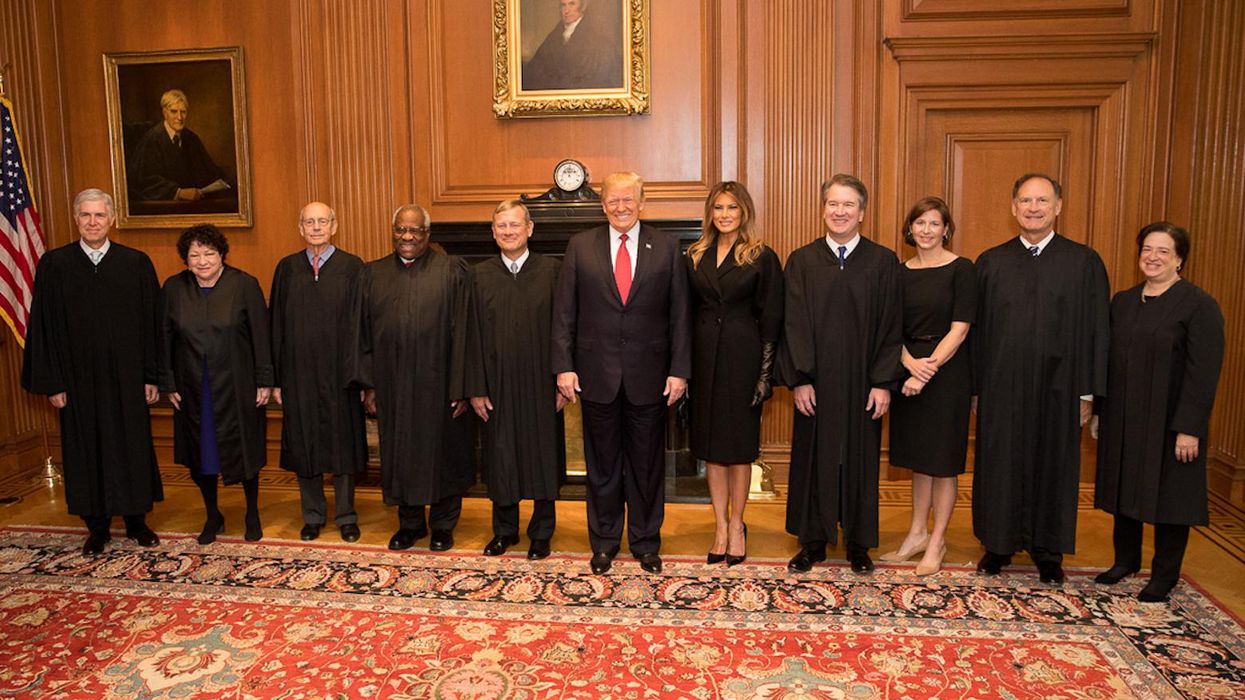Whether former President Donald Trump is ever truly held accountable for his crimes depends entirely upon the outcome of the November election. And as The Atlantic's Quinta Jurecic writes, he largely has the Supreme Court of the United States (SCOTUS) to thank for that.
In her Wednesday essay, Jurecic — a senior editor at Lawfare — laid out how SCOTUS' 6-3 conservative supermajority has consistently been the former president's strongest ally in his efforts to stay out of prison. She posited that Trump may already be behind bars after being found guilty of 34 felonies in New York earlier this year were it not for SCOTUS' assistance in his stalling tactics.
According to Jurecic, the Court signaled that it would be playing a significant role in the former president's efforts to delay criminal accountability when it granted a writ of certiorari to hear Trump's argument for absolute broad criminal immunity. The Court's decision to hear the case despite both U.S. District Judge Tanya Chutkan and the D.C. Circuit Court of Appeals agreeing that the president was not above the law meant that the final decision in Trump v. United States wouldn't be announced until just a few months before the election.
READ MORE: 'Political and traitorous decision': Experts outraged by SCOTUS taking Trump immunity case
After the 6-3 decision was handed down in July, Trump was then able to leverage that in two or his four criminal cases in New York and Washington, D.C. Jurecic explained that thanks to the decision's vague wording — in which presidents are granted immunity for "official acts" but lower courts have to decide what constitutes an "official act" — Trump's delay campaign is aided by legal murkiness.
Judge Chutkan noted in a recent hearing that her decisions could still be subject to reversal by SCOTUS "no matter what I do." This means that despite given latitude by SCOTUS to decide how the immunity ruling is to be applied in her courtroom, conservatives on the SCOTUS bench could still end up throwing out her decisions if they don't approve of them.
"[H]ow is she to identify the fuzzy line between unofficial and official conduct? The Supreme Court has provided precisely no guidance. According to a scheduling order that Chutkan released following last week’s hearing, the briefing alone on the immunity question will take until October 29, six days before the election," Jurecic wrote. "And, importantly, because the Court also indicates that Trump can immediately appeal any decision from lower courts on these questions—what’s known as an 'interlocutory appeal'—whatever Chutkan does could well be subject to months and months of additional litigation."
Jurecic noted that the original July sentencing date for Trump's felony convictions that was pushed back to September was once again delayed until late November — weeks after the presidential election. She argued this abundance of caution from Judge Juan Merchan is not his own doing, but rather the situation he was forced into thanks to the massive legal grey area created by the Trump v. United States decision.
READ MORE: Donald Trump guilty on all counts in New York criminal trial
"For those who hoped that Trump might finally face criminal accountability before the election, this is a frustrating dodge—another example of the legal system’s apparent inability to hold Trump responsible for his actions," she wrote. "But the real villain here isn’t Bragg or Merchan, who are doing their best to carry out justice under difficult circumstances. It’s the Supreme Court, which created an unmanageable situation that played directly into Trump’s goal of delaying a legal reckoning."
"None of this was preordained. The Supreme Court didn’t need to take up the immunity case to begin with. Once it did, the overwhelming majority of experts and commentators—myself included—expected that, at most, the Court would fashion a rule carving out some limited category of immunized conduct, perhaps creating difficulties in the January 6 case but certainly not creating problems in New York," she continued. "Instead, the conservative justices issued a ruling that not only established a sweeping and poorly defined immunity but also created so many avenues for challenge and confusion that the Court functionally collaborated in Trump’s strategy of delay."
Click here to read Jurecic's full essay in the Atlantic.
READ MORE: 'Pared away all official conduct': Expert says Jack Smith's new indictment is immunity-proof


